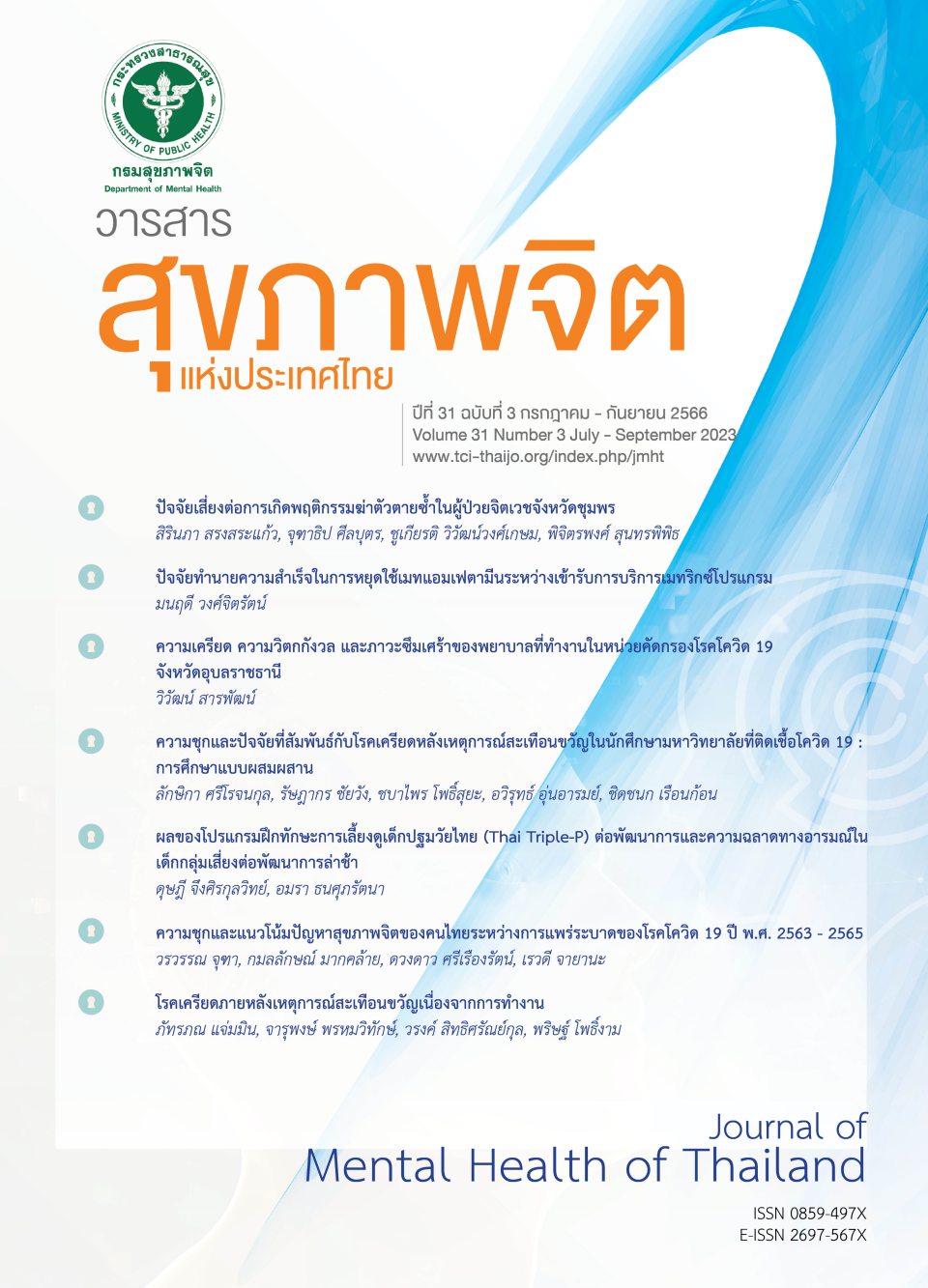ผลของโปรแกรมฝึกทักษะการเลี้ยงดูเด็กปฐมวัยไทย (Thai Triple-P) ต่อพัฒนาการและความฉลาดทางอารมณ์ในเด็กกลุ่มเสี่ยงต่อพัฒนาการล่าช้า
คำสำคัญ:
ความฉลาดทางอารมณ์, เด็กปฐมวัย, โปรแกรมฝึกทักษะการดูแล, พัฒนาการล่าช้า, วินัยเชิงบวกบทคัดย่อ
วัตถุประสงค์ : เพื่อศึกษาผลของโปรแกรมฝึกทักษะการเลี้ยงดูเด็กปฐมวัยไทย (Thai Triple-P) ต่อพัฒนาการและความฉลาดทางอารมณ์ในเด็กกลุ่มเสี่ยงต่อพัฒนาการล่าช้า
วิธีการ : การวิจัยกึ่งทดลองแบบสองกลุ่มในเด็กปฐมวัยอายุ 3 - 5 ปีและพ่อแม่ผู้ปกครอง ในศูนย์พัฒนาเด็กเล็กจังหวัดเชียงใหม่ กลุ่มควบคุม 31 คู่ได้รับการส่งเสริมพัฒนาการตามคู่มือเฝ้าระวังและส่งเสริมพัฒนาการเด็กปฐมวัย (developmental surveillance promotion manual: DSPM) ในระบบปกติ กลุ่มทดลอง 40 คู่ได้รับการดูแลในระบบปกติร่วมกับโปรแกรม Thai Triple-P กลุ่มละ 10 - 15 คู่ จำนวน 4 ครั้ง ครั้งละ 90 - 120 นาที วัดผลก่อนและหลังการทดลอง 1 เดือนด้วยแบบคัดกรองพัฒนาการ DSPM แบบประเมินความฉลาดทางอารมณ์เด็กอายุ 3 - 5 ปี ฉบับย่อ (สำหรับผู้ปกครอง) และแบบประเมินทักษะการเลี้ยงดูเด็กปฐมวัย ฉบับ 32 ข้อ เปรียบเทียบสัดส่วนเด็กพัฒนาการสมวัยก่อนและหลังการทดลองด้วยสถิติ chi-square เปรียบเทียบคะแนนเฉลี่ยความฉลาดทางอารมณ์และทักษะการเลี้ยงดูระหว่างกลุ่มด้วยสถิติ Independent t-test
ผล : ก่อนทดลอง กลุ่มทดลองและกลุ่มควบคุมมีพัฒนาการสมวัยร้อยละ 10.0 และ 6.5 ตามลำดับ (p = 0.48) ค่าเฉลี่ยความฉลาดทางอารมณ์ 42.9 และ 44.3 คะแนน ตามลำดับ (p = 0.27) และค่าเฉลี่ยทักษะการเลี้ยงดูเด็กปฐมวัย 111.7 และ 109.7 คะแนน ตามลำดับ (p = 0.64) หลังทดลอง กลุ่มทดลองและกลุ่มควบคุมมีพัฒนาการสมวัยร้อยละ 90.0 และ 36.7 ตามลำดับ (p < .01) ค่าเฉลี่ยความฉลาดทางอารมณ์ 48.6 และ 45.2 คะแนน ตามลำดับ (p < .001) ขนาดของผลลัพธ์ (effect size) 0.72 และค่าเฉลี่ยทักษะการเลี้ยงดูเด็กปฐมวัย 128.7 และ 114.3 คะแนน ตามลำดับ (p < .001) ขนาดของผลลัพธ์ 1.29
สรุป : โปรแกรม Thai Triple-P สามารถส่งเสริมพัฒนาการและความฉลาดทางอารมณ์ในเด็กปฐมวัยกลุ่มเสี่ยงต่อพัฒนาการล่าช้า รวมทั้งส่งเสริมทักษะการเลี้ยงดูของพ่อแม่ผู้ปกครองในระดับสูง
Downloads
เอกสารอ้างอิง
World Health Organization. Improving early childhood development: WHO guideline [Internet]. Geneva: World Health Organization; 2020 [cited 2021 Apr 1]. Available from: https://www.who.int/publications/i/item/97892400020986
Herman H, Saxena S, Moodie R. Promoting mental health: concepts, emerging evidence, practice [Internet]. Geneva: World Health Organization; 2005 [cited 2022 Dec 15]. Available from: https://www.who.int/publications/i/item/9241562943
จินตนา พัฒนพงศ์ธร, ชัยชนะ บุญสุวรรณ, นฤมล ธนเจริญวัชร. ผลการศึกษา “พัฒนาการเด็กปฐมวัยไทย” [The study of Thai early child development]. นนทบุรี: กรมอนามัย กระทรวงสาธารณสุข; 2558.
สถาบันราชานุกูล. ผลการสำรวจสถานการณ์ IQ EQ เด็กไทย ปี 2559 [A 2016 situational survey of intelligence quotient (IQ) and emotional quotient (EQ) among Thai children]. นนทบุรี: สถาบัน; 2559.
สถาบันพัฒนาอนามัยเด็กแห่งชาติ. รายงานประจำปี 2560 สถาบันพัฒนาอนามัยเด็กแห่งชาติ [The institute of child development’s 2017 annual report]. กรุงเทพฯ: บริษัท สามเจริญพาณิชย์ (กรุงเทพฯ) จำกัด; 2560.
กระทรวงสาธารณสุข. คู่มือเฝ้าระวังและส่งเสริมพัฒนาการเด็กปฐมวัย [Developmental surveillance and promotion manual (DSPM)] [อินเทอร์เน็ต]. นนทบุรี: กระทรวง; 2558 [สืบค้นเมื่อวันที่ 2 ธ.ค. 2561]. จาก: https://www.thaichilddevelopment.com/images/doc/คู่มือเฝ้าระวังและส่งเสริมพัฒนาการเด็กปฐมวัย(DSPM).pdf
กรมอนามัย. รายงานประจำปี กรมอนามัย 2561 [Department of health annual report 2018 [อินเทอร์เน็ต]. นนทบุรี: กรม; 2561 [สืบค้นเมื่อวันที่ 1 ม.ค. 2562]. จาก: https://planning.anamai.moph.go.th/th/annual-report/1038#wow-book/.
Hirai AH, Kogan MD, Kandasamy V, Reuland C, Bethell C. Prevalence and variation of developmental screening and surveillance in early childhood. JAMA Pediatr. 2018;172(9):857-66. doi:10.1001/jamapediatrics.2018.1524.
สถาบันพัฒนาอนามัยเด็กแห่งชาติ กรมอนามัย. สรุปผลการดำเนินงาน โครงการส่งเสริมพัฒนาการเฉลิมพระเกียรติสมเด็จพระเทพรัตนราชสุดาฯ สยามบรมราชกุมารี ในโอกาสฉลองพระชนมายุ 5 รอบ 2 เมษายน 2558 [Summary of operating results development promotion project in honor of Her Royal Highness Princess Maha Chakri Sirindhorn on the occasion of His Majesty's 5th birthday celebration, 2 April 2015]. พิมพ์ครั้งที่ 1. นนทบุรี: สถาบัน; 2561 [สืบค้นเมื่อวันที่ 1 ม.ค. 2562]. จาก: https://nich.anamai.moph.go.th/web-upload/migrated/files/nich/213_article_file.pdf
Morrison J, Chunsuwan I, Bunnag P, Gronholm PC, Lockwood Estrin G. Thailand's national universal developmental screening programme for young children: action research for improved follow-up. BMJ Glob Health. 2018;3(1):e000589. doi:10.1136/bmjgh-2017-000589.
Peters M, Seeds K, Goldstein A, Coleman N. Parental involvement in children’s education 2007. London: BMRB International Ltd.; 2008.
Engle PL, Fernald L, Alderman H, Behrman J, O'Gara C, Yousafzai A, et al. Strategies for reducing inequalities and improving developmental outcomes for young children in low-income and middle-income countries. Lancet. 2011;378(9799):1339-53. doi:10.1016/S0140-6736(11)60889-1.
Bandura A. Self-efficacy: the exercise of control. New York: Freeman and Company; 1997.
กลุ่มสนับสนุนวิชาการและการวิจัย สำนักส่งเสริมสุขภาพ กรมอนามัย. การศึกษาปัจจัยที่มีผลต่อพัฒนาการ เด็กปฐมวัยไทย ครั้งที่ 6 2560. นนทบุรี: กลุ่ม; 2561 [สืบค้นเมื่อวันที่ 1 ม.ค. 2562]. จาก: https://datahpc9.anamai.moph.go.th/group_sr/allfile/1580280672.pdf
กรมอนามัย. รายงานประจำปี กรมอนามัย 2560 [Department of health annual report 2017] [อินเทอร์เน็ต]. นนทบุรี: กรม; 2560 [สืบค้นเมื่อวันที่ 1 ม.ค. 2562]. จาก: https://backenddc.anamai.moph.go.th/coverpage/c68879242af9af26144520f4caee6930.pdf
Engle PL, Black MM, Behrman JR, Cabral de Mello M, Gertler PJ, Kapiriri L, et al. Strategies to avoid the loss of developmental potential in more than 200 million children in the developing world. Lancet. 2007;369(9557):229-42. doi:10.1016/S0140-6736(07)60112-3.
Zhong J, He Y, Chen Y, Luo R. Relationships between parenting skills and early childhood development in rural households in western China. Int J Environ Res Public Health. 2020;17(5):1506. doi:10.3390/ijerph17051506.
Jeong J, Franchett EE, Ramos de Oliveira CV, Rehmani K, Yousafzai AK. Parenting interventions to promote early child development in the first three years of life: a global systematic review and meta-analysis. PLoS Med. 2021;18(5):e1003602. doi:10.1371/journal.pmed.1003602.
Durrant JE. Positive discipline in everyday teaching: guideline for educator. Bangkok: Save the Children Sweden; 2013.
Nelsen J. Positive discipline: teaching children self-discipline, responsibility, cooperation and problem-solving skills. Ohio, US: Empowering People, Incorporated; 1981.
ปิยวลี ธนเศรษฐกร, ปนัดดา ธนเศรษฐกร. 101 เทคนิคการสร้างวินัยเชิงบวก [101’s positive discipline]. กรุงเทพฯ: Than Books; 2552.
Alegre A. Parenting styles and children’s emotional intelligence: what do we know? The Family Journal. 2011;19(1):56-62. doi:10.1177/1066480710387486.
Gibson CH. A concept analysis of empowerment. J Adv Nurs. 1991;16(3):354-61. doi:10.1111/j.1365-2648.1991.tb01660.x.
Goldstein EB. Cognitive psychology: connecting mind, research, and everyday experience. 3rd ed. Belmont, CA: Wadsworth; 2011.
Fogler J. Review of attachment theory and research: new directions and emerging themes. J Dev Behav Pediatr. 2016;37(9):701. doi:10.1097/DBP.0000000000000344.
Thomas R, Zimmer-Gembeck MJ. Behavioral outcomes of parent-child interaction therapy and Triple P-positive parenting program: a review and meta-analysis. J Abnorm Child Psychol. 2007;35(3):475-95. doi:10.1007/s10802-007-9104-9.
พัชรา พุ่มพชาติ. ผลการใช้ชุดฝึกอบรมผู้ปกครองเรื่องการสร้างวินัยเชิงบวกผ่านกระบวนการมีส่วนร่วมของผู้ปกครองที่มีต่อวินัยในตนเองและความเชื่อมั่นในตนเองของเด็กปฐมวัยในศูนย์พัฒนาเด็กเล็ก สังกัดองค์กรปกครองส่วนท้องถิ่น อำเภอเมือง จังหวัดชัยนาท [Effectiveness of the utilization of the parent training package aiming to develop positive discipline and self-confidence in young children through parental involvement at the child development centers under local administration organizations at the Mueang Chainat district, Chainat province Thailand]. วารสารวิชาการและวิจัยสังคมศาสตร์. 2561;13(38):15-30.
สมัย ศิริทองถาวร. การพัฒนาคู่มือเฝ้าระวังและส่งเสริมพัฒนาการเด็กปฐมวัย [The development of developmental surveillance and promotion manual; DSPM]. วารสารสมาคมจิตแพทย์แห่งประเทศไทย. 2561;63(1):3-12.
สมพร อินทร์แก้ว, เยาวนาฏ ผลิตนนท์เกียรติ, กาญจนา วณิชรมณีย์, อมรากุล อินโอชานนท์, ภัคนพิน กิตติรักษนนท์, วิไล เสรีสิทธิพิทักษ์, และคณะ. รายงานวิจัยการพัฒนาแบบประเมินความฉลาดทางอารมณ์เด็กอายุ 3-5 ปี และ 6-11 ปี (ฉบับย่อ) [Research on the development of the Thai emotional intelligence screening test for ages 3 to 5 and 6 to 11 (abridged edition)]. นนทบุรี: กรมสุขภาพจิต กระทรวงสาธารณสุข; 2546.
คำพวง ห่อทอง. การศึกษาเปรียบเทียบพฤติกรรมส่งเสริมการเล่นของบิดามารดาและพฤติกรรมการปรับตัวของเด็กปฐมวัยในเขตกรุงเทพมหานครกับจังหวัดสุรินทร์ [The comparative study on paternal and maternal behaviors in promoting play and adaptive behavior between children residing in Bangkok and Surin province] [สารนิพนธ์ปริญญามหาบัณฑิต]. กรุงเทพฯ: มหาวิทยาลัยศรีนครินทรวิโรฒ; 2548.
Barlow J, Coren E. The effectiveness of parenting programs: a review of Campbell reviews. Res Soc Work Pract. 2017;28(1):104973151772518. doi:10.1177/1049731517725184
Reynolds AJ, Lee S, Eales L, Varshney N, Smerillo N. Parental involvement and engagement in early education contribute to children’s success and well-being. In: Bierman KL, Sheridan SM, editors. Family-school partnerships during the early school years. Research on family-school partnerships. Springer, Cham; 2021.
Gomez ML, Bernal R, Baker-Henningham H. Qualitative evaluation of a scalable early childhood parenting programme in rural Colombia. Child Care Health Dev. 2022;48(2):225-38. doi:10.1111/cch.12921.
ดาวน์โหลด
เผยแพร่แล้ว
รูปแบบการอ้างอิง
ฉบับ
ประเภทบทความ
สัญญาอนุญาต
ลิขสิทธิ์ (c) 2023 วารสารสุขภาพจิตแห่งประเทศไทย

อนุญาตภายใต้เงื่อนไข Creative Commons Attribution-NonCommercial-NoDerivatives 4.0 International License.
- ผู้อ่านสามารถนำข้อความ ข้อมูล จากวารสารไปใช้ไปใช้ประโยชน์ทางวิชาการได้ เช่น เพื่อการสอน เพื่อการอ้างอิง แต่การนำไปใช้เพื่อวัตถุประสงค์อื่น เช่น เพื่อการค้า จะต้องได้รับอนุญาตเป็นลายลักษณ์อักษรจากกรมสุขภาพจิตก่อน
- ความคิดเห็น ข้อมูล และบทสรุปต่าง ๆ ที่ลงตีพิมพ์ในวารสารสุขภาพจิตแห่งประเทศไทยเป็นของผู้เขียนบทความและมิได้แสดงว่ากองบรรณาธิการหรือกรมสุขภาพจิตเห็นพ้องด้วย




